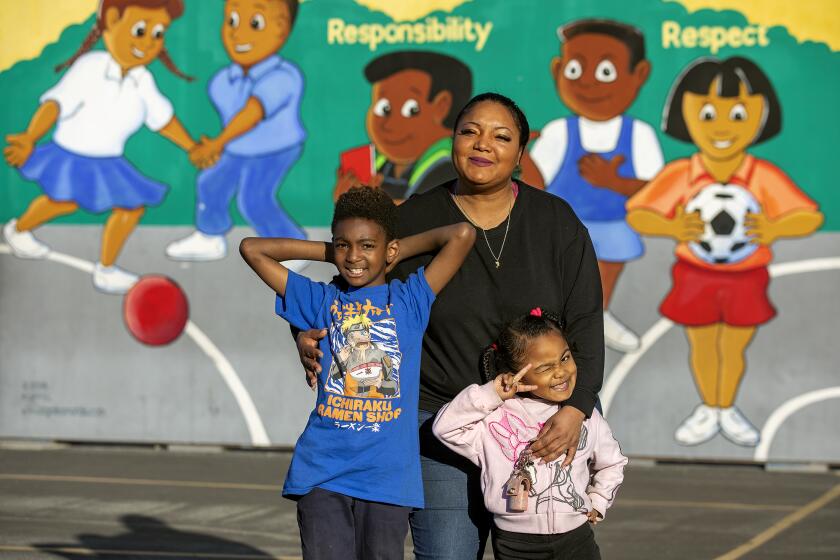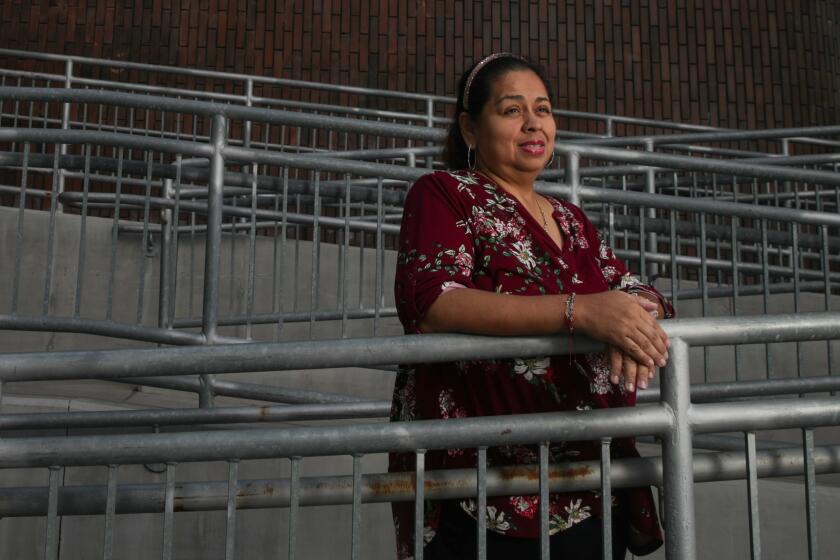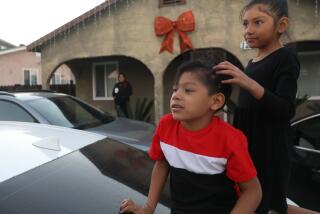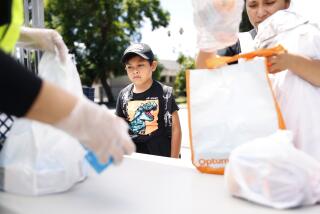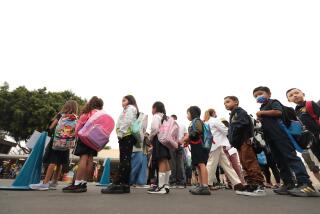What? A strike? Parents blindsided by looming LAUSD walkout that is closing schools
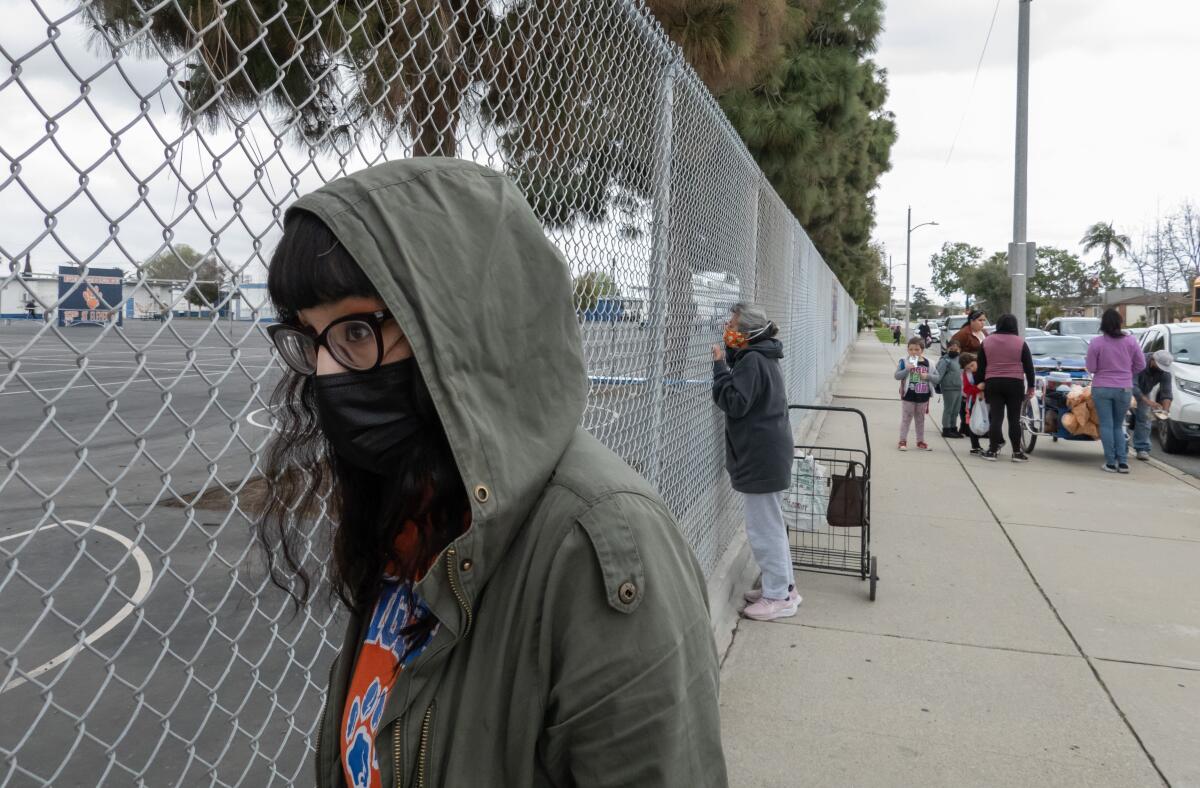
Like most parents in the nation’s second-largest school district , Marianne Webster was shocked to learn of the massive strike set to shutter public schools across Los Angeles for three days next week.
She was even more shocked to learn about it from her third-grader.
“When I picked him up he said, ‘The teachers are going on strike,’” said the mother of four, whose two eldest children attend 186th Street Elementary School in Gardena, where 70% of students take the bus to campus and 100% get free lunch. “I said, ‘What?!’”
For Los Angeles Unified School District bus drivers, cafeteria workers, teacher assistants and custodians, the three-day strike has been months in the making as they are hold firm in their demand for a 30% pay raise. Yet few outside Local 99 of Service Employees International Union took notice until United Teachers of Los Angeles announced late last week that its members would walk out alongside them.
Days later, most parents were only just finding out.
“What do you mean they’re not going to go to school for three days?” 186th Street Elementary School mom Edith Castillo recalled thinking when she saw the huge union rally in Grand Park on the news Wednesday night.
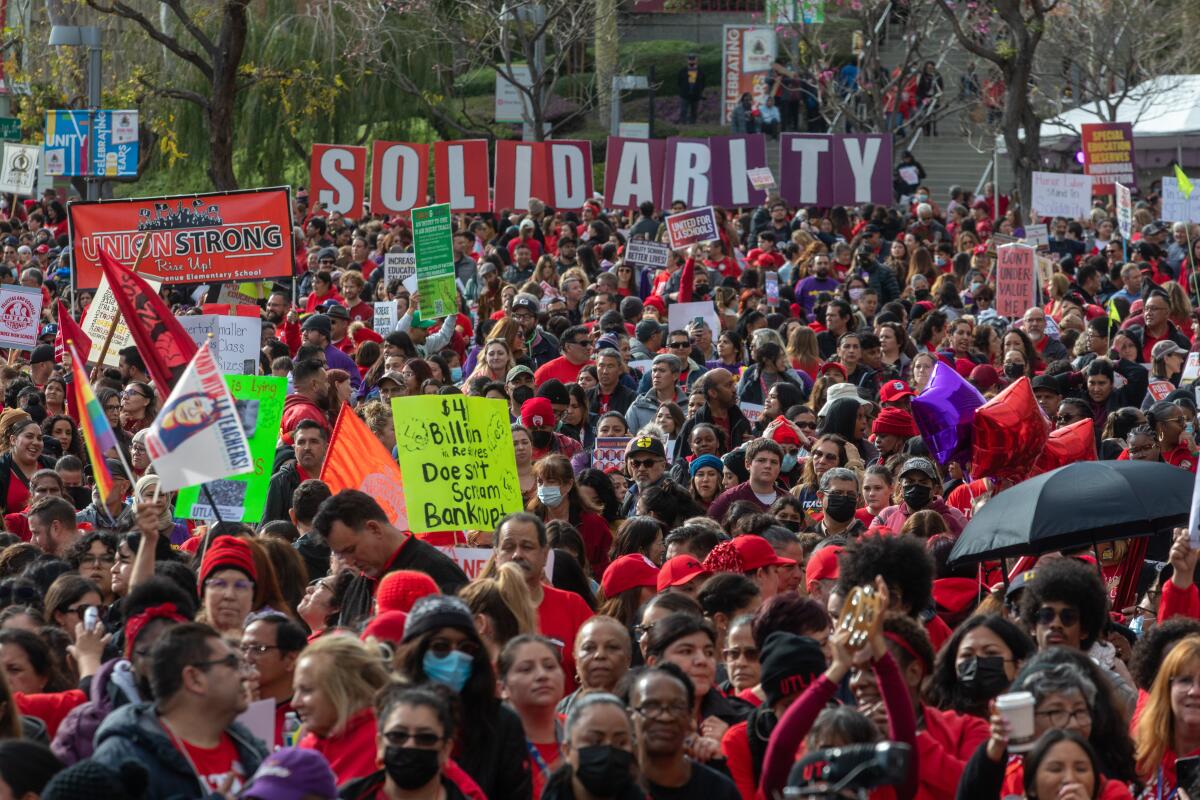
That question was seemingly repeated thousands of times outside hundreds of schools across Los Angeles this week as parents were first hit with the news — and then traded speculation and rumors. Many said they felt blindsided by the sudden closures. Many more struggled to believe it would actually come to pass.
“I don’t think they’ll really do it,” said Cajuan Banks, 42, as he collected his two young children from Crescent Heights Elementary School in Picfair Village Wednesday afternoon.
But others couldn’t take the chance. As the reality of the strike sank in Friday, working parents raced to secure spots in stopgap programs set up by the YMCA, Boys and Girls Club, and the Los Angeles Parks and Recreation Department, or to co-op care with friends and family.
Others scrambled to rearrange their schedules and budget a way to do without the wages they would have earned.
“I’ll have to stop working if they’re going to stay home,” said Crescent Heights mom Erika Aguilar, 35, who works at a bakery in Beverly Hills. “Right now everything is so expensive, it’s going to be very hard.”
Hunger, too, was top of mind. District spokeswoman Shannon Haber said administrators were hustling to finalize plans for grab-and-go meals. But how that would happen without thousands of Local 99 food service workers was still being worked out when the dismissal bell rang Friday afternoon.
In a district where most students eat breakfast and lunch at school and many take home supper, parents went into the weekend wondering how they would feed their children in the week to come.
El Sereno Elementary parent Joshua Tamases, 54, has been following the news of the school closures with dread and disbelief.
California’s ‘missing’ students may have moved away, be home-schooling without notifying the state, or simply be out of school.
Earlier this month, the single father of two suffered a blow when his CalFresh benefits were reduced by around $100 as some COVID-19 aid was not renewed. The prospect of feeding his children breakfast and lunch for a few unanticipated days means more belt tightening.
“We’re going to do more with less,” Tamases said at dismissal Thursday. “With the way the economy is and inflation, everything just seems to get more and more difficult.”
But frustration stretched far beyond food and child care.
For many, the three-day strike was a bitter reminder of their children’s school setbacks, how they have fallen behind, both socially and academically, following protracted pandemic campus closures and a rocky return to the classroom.
Last year, half of all LAUSD students were chronically absent. This year, more than 150,000 California public school students were missing altogether — far more than switched to private schools or homeschooling — while a “tripledemic” of flu, COVID-19 and RSV kept thousands of newly unmasked and immunologically naive young children home sick for days at a time.
Now, principals were sending home 10 days of school work for what parents had been told was a three-day hiatus. The move was meant to give families flexibility, the district spokeswoman said. But some parents reacted with alarm. Three days was bearable, maybe. But an indefinite disruption less than a month after mid-winter recess and just a week before the start of spring break felt existential.
“I don’t know how I’m going to do it,” said Castillo, whose first-grader is just learning to read. “My main concern is she’ll get behind, especially on reading and writing,” skills children must master by age 9 to avoid falling behind other subjects, experts say.
The gap raises questions about whether families are fully informed about the extent of their children’s academic setbacks and whether they are being well positioned to push for additional help.
El Sereno Elementary School mother Teresa Aguilar, 38, was similarly disappointed that a school district still reeling from pandemic learning setbacks would put itself in a position to surrender “more valuable learning time.”
“The kids haven’t recovered from the last break and now we’re going to send them home again,” she said. “It might be only three days, but that’s a lot.”
In reality, three days is a lot more for some students than others. A magnet school senior might not mind staying home to await college admissions decisions, while a deaf toddler helped by a specialized district program could languish in isolation from their American Sign Language-fluent teachers.
But for the district’s very youngest parents, the pregnant teens and adolescent mothers who attend McAllister High School, a strike means losing both their instructional hours and their child care.
For these student-parents, “the clock is ticking all the time,” said one teacher.
“The clock is ticking for you to be done with school. The clock is ticking for you to learn English. The clock is ticking for you to figure out how to advocate for yourself and your child,” teacher Tanya Reyes explained. “Now you’re a student and a mom.”
For her students, Reyes said every day out of the classroom is a day closer to delivery, or to the day their babies grow from docile infants into demanding toddlers.
But she believes her school can’t attract the bilingual aides they need unless Local 99 gets the bump in pay that workers are striking for.
And despite the late-breaking news of the school closures and widespread anxiety, many parents agree with her.
“I’m 100% on board,” said dad Gio Rangel, 29, who works for UPS and is part of the International Brotherhood of Teamsters. “If we don’t have a contract by August, we’ll be on strike ourselves.”
According to a recent Loyola-Marymount poll, almost 80% of LA parents said they would support a teacher’s strike if labor negotiations broke down — though those interviewed Wednesday and Thursday estimated support for the upcoming strike at closer to 50%.
That would be a stark contrast with the six-day teacher’s strike in 2019, when tens of thousands of parents kept their children home even as classrooms remained open — staffed by the very workers who are leading the walkout on Tuesday.
The difference, said Jessica Aguilera, 34, is that families four years ago had more time to prepare.
“This time, a lot of parents don’t know,” the mother of three explained as she waited for dismissal at 153rd Street Elementary School in Gardena on Thursday. “I was handing out fliers and they were totally in the dark.”
With so little warning, many parents found their solidarity threadbare.
“I don’t really agree with the strike — three days is a long time — but these workers are doing double duty,” said 186th Street Elementary School parent Yazmin Hernandez, 32, as she filled bags with crayons, scissors, pencils and glue for students to take home. “The district isn’t giving them the benefits they’re supposed to. They go above and beyond and get nothing in return.”
For her, understanding had an expiration date.
“Three days we can bear it, maybe,” she said. “But more than three days, no.”
More to Read
Sign up for Essential California
The most important California stories and recommendations in your inbox every morning.
You may occasionally receive promotional content from the Los Angeles Times.
